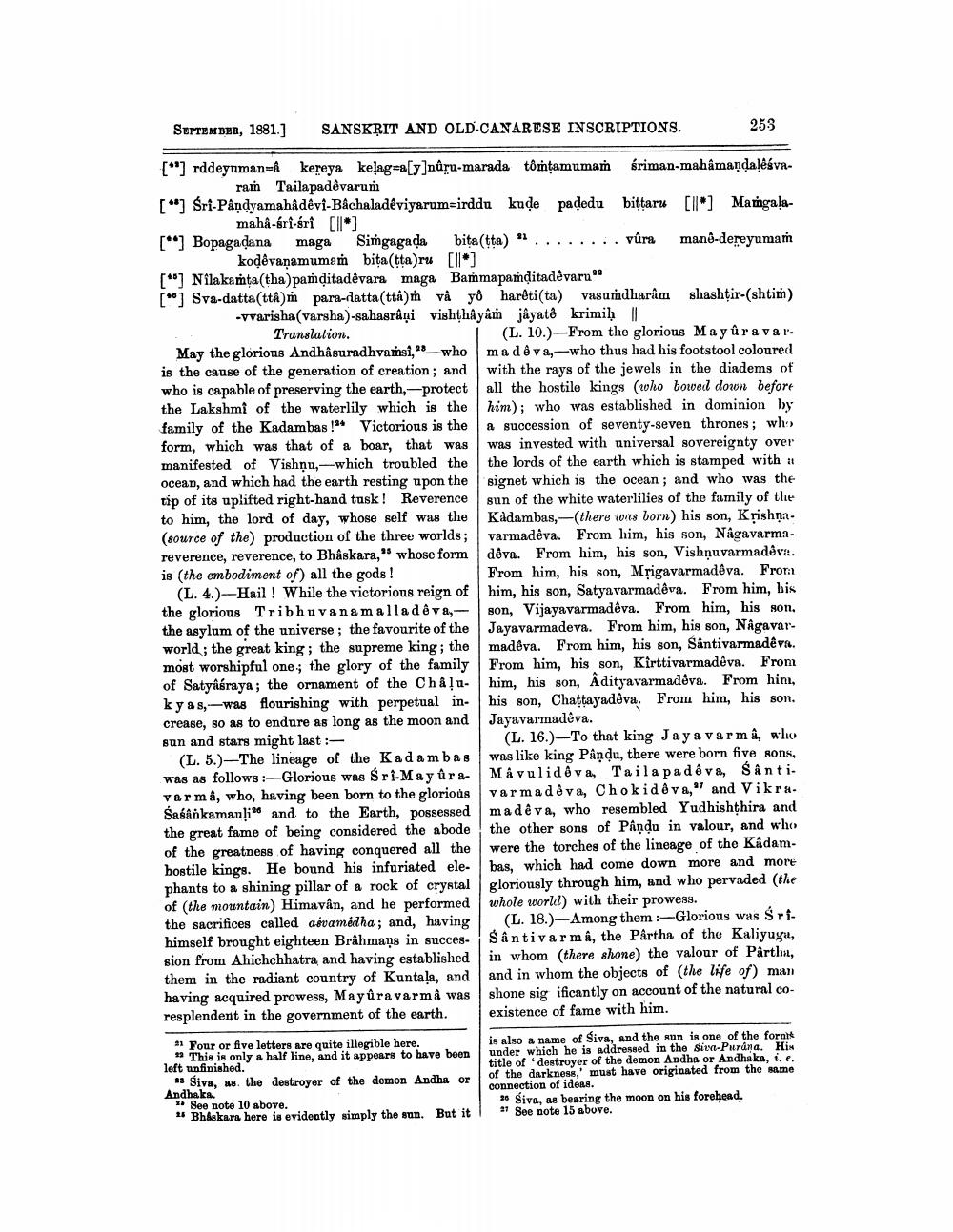________________
SEPTEMBER, 1881.]
SANSKRIT AND OLD-CANARESE INSCRIPTIONS.
[] rddeyuman- kereya kelag=a[y]nuru-marada tômṭamumam śriman-mahâmaṇḍalêśvaram Tailapadêvarum
[] Sri-Padyamahadevi-Bichaladéviyarum-irddu kude padodu bittaru [1] Mangala maha-éri-śri [*]
Translation.
May the glorious Andhâsuradhvamsi, 2-who is the cause of the generation of creation; and who is capable of preserving the earth,-protect the Lakshmi of the waterlily which is the family of the Kadambas!" Victorious is the form, which was that of a boar, that was manifested of Vishnu,-which troubled the ocean, and which had the earth resting upon the tip of its uplifted right-hand tusk! Reverence to him, the lord of day, whose self was the (source of the) production of the three worlds; reverence, reverence, to Bhaskara," whose form is (the embodiment of) all the gods!
(L. 4.)-Hail! While the victorious reign of the glorious Tribhuvanamalladêva, the asylum of the universe; the favourite of the world; the great king; the supreme king; the most worshipful one; the glory of the family of Satyasraya; the ornament of the Châlukyas, was flourishing with perpetual in crease, so as to endure as long as the moon and sun and stars might last :
[*] Bopagaḍana maga Singagada bita (tta) kodêvaṇamumam bita (tta)ru [*]
[*] Nilakamta(tha) pamḍitadêvara maga Bammapamḍitadêvaru"
[*] Sva-datta (tt)m para-datta (tta)m và yô harêti(ta) vasumdharâm shashtir-(shtim) -vvarisha (varsha)-sahasrâni vishṭhâyâm jâyatê krimiḥ ||
(L. 5.) The lineage of the Kadambas was as follows:-Glorious was Śri-Mayûravarmâ, who, having been born to the glorious Sasankamauli and to the Earth, possessed the great fame of being considered the abode of the greatness of having conquered all the hostile kings. He bound his infuriated elephants to a shining pillar of a rock of crystal of (the mountain) Himavân, and he performed the sacrifices called aévamédha; and, having himself brought eighteen Brâhmans in succession from Ahichchhatra and having established them in the radiant country of Kuntala, and having acquired prowess, Mayûra varmâ was resplendent in the government of the earth.
21 Four or five letters are quite illegible here.
22 This is only a half line, and it appears to have been left unfinished.
33 Siva, as. the destroyer of the demon Andha or Andhaka.
See note 10 above.
2 Bhaskara here is evidently simply the sun. But it
21
vûra
253
mand-degeyuma
(L. 10.)-From the glorious Mayûravar. madê va,-who thus had his footstool coloured with the rays of the jewels in the diadems of all the hostile kings (who bowed down before him); who was established in dominion by a succession of seventy-seven thrones; who was invested with universal sovereignty over the lords of the earth which is stamped with a signet which is the ocean; and who was the sun of the white waterlilies of the family of the Kadambas,-(there was born) his son, Krishnavarmadêva. From him, his son, Nagavarmadêva. From him, his son, Vishnuvarmadevi. From him, his son, Mrigavarmadêva. From him, his son, Satyavarmadêva. From him, his son, Vijayavarmadêva. From him, his son. Jayavarmadeva. From him, his son, Nagavarmadêva. From him, his son, Śântivarmadêva. From him, his son, Kirttivarmadêva. From him, his son, Adityavarmadêva. From him, his son, Chattayadêva. From him, his son. Jayavarmadêva.
(L. 16.)-To that king Jaya varmâ, who was like king Pându, there were born five sons, Mâvulidêva, Taila padêva, Śântivarmadêva, Chokidêva," and Vikra madê va, who resembled Yudhishthira and the other sons of Pându in valour, and who were the torches of the lineage of the Kâdambas, which had come down more and more gloriously through him, and who pervaded (the whole world) with their prowess.
(L. 18.)-Among them :-Glorious was ŚriSântivarmâ, the Pârtha of the Kaliyuga, in whom (there shone) the valour of Pârtha, and in whom the objects of (the life of) man shone sig ificantly on account of the natural coexistence of fame with him.
is also a name of Siva, and the sun is one of the forms under which he is addressed in the Siva-Purána. His title of destroyer of the demon Andha or Andhaka, i. e. of the darkness,' must have originated from the same connection of ideas.
25 Siva, as bearing the moon on his forehead. 27 See note 15 above.




